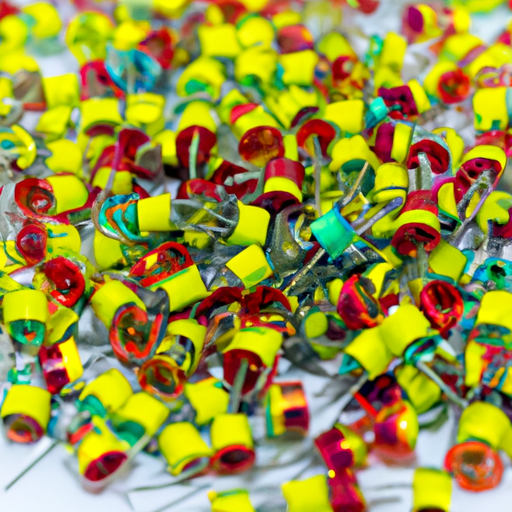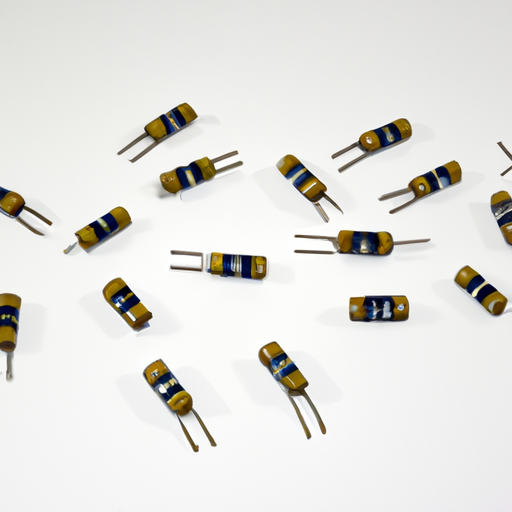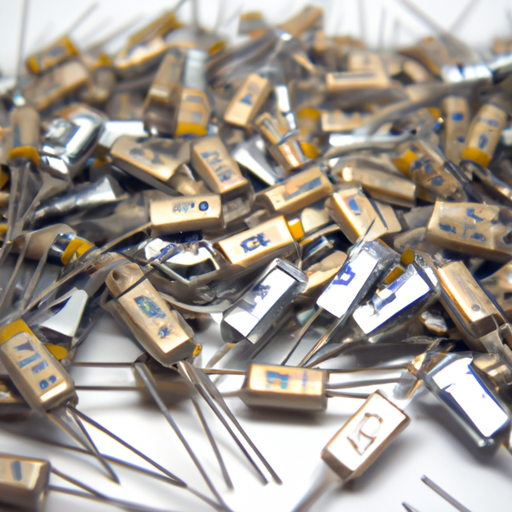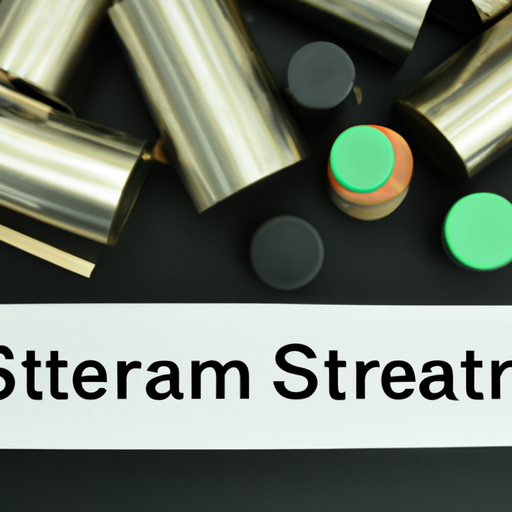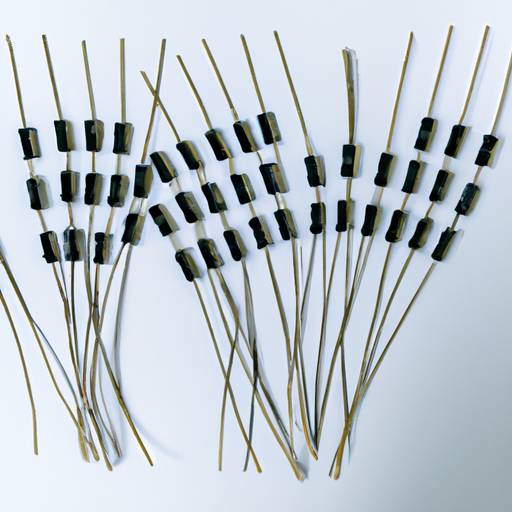What is the price of popular color ring resistor models in stock?
What is the Price of Popular Color Ring Resistor Models in Stock?
I. Introduction
Color ring resistors are essential components in electronic circuits, serving the critical function of limiting current flow and dividing voltages. These resistors are characterized by their distinctive color bands, which indicate their resistance values and tolerances. Understanding the pricing of these components is vital for hobbyists, engineers, and manufacturers alike, as it can significantly impact project budgets and production costs. This article aims to provide an overview of popular color ring resistor models, their features, and their current market prices.
II. Understanding Color Ring Resistors
A. Explanation of the Color Coding System
The color coding system used in resistors is a standardized method that allows users to quickly determine the resistance value and tolerance of a resistor. Each color corresponds to a specific number, with black representing 0 and white representing 9. The first two or three bands indicate the significant digits of the resistance value, while the next band represents the multiplier. The final band, if present, indicates the tolerance level, which is crucial for applications requiring precision.
1. How to Read Resistor Color Codes
To read a resistor's color code, one must identify the colors of the bands and match them to their corresponding numbers. For example, a resistor with bands of red, red, and brown would have a resistance value of 22 ohms with a tolerance of ±1%. This system allows for quick identification and selection of resistors in various applications.
2. Importance of Tolerance and Temperature Coefficient
Tolerance indicates how much the actual resistance can vary from the stated value, which is critical in precision applications. The temperature coefficient, on the other hand, describes how the resistance changes with temperature, affecting the resistor's performance in varying environmental conditions.
B. Types of Resistors
Resistors come in various types, each suited for different applications:
1. Fixed Resistors
These resistors have a predetermined resistance value and are the most common type used in electronic circuits. They are available in various materials, including carbon and metal film.
2. Variable Resistors
Variable resistors, such as potentiometers, allow users to adjust the resistance value manually. They are often used in applications like volume controls and tuning circuits.
3. Specialty Resistors
Specialty resistors include precision resistors, which offer tighter tolerances, and high-power resistors, designed to handle higher wattages without overheating.
III. Popular Color Ring Resistor Models
A. Overview of Commonly Used Models
Several resistor models are widely used in electronic projects and applications. Here are some of the most popular:
1. 1/4 Watt Carbon Film Resistors
These resistors are commonly used in general-purpose applications. They offer good stability and are cost-effective, making them a favorite among hobbyists and professionals alike.
2. 1/4 Watt Metal Film Resistors
Metal film resistors provide better accuracy and stability compared to carbon film resistors. They are often used in precision applications where performance is critical.
3. 1/2 Watt Carbon Film Resistors
Similar to their 1/4 watt counterparts, these resistors can handle higher power levels, making them suitable for applications that require more robust components.
4. 1/2 Watt Metal Film Resistors
These resistors combine the benefits of higher wattage with the precision of metal film technology, making them ideal for demanding electronic circuits.
5. Specialty Resistors (e.g., Precision, High-Power)
Specialty resistors are designed for specific applications, such as high-frequency circuits or high-temperature environments. They often come with enhanced features, such as lower noise levels and better thermal stability.
B. Features and Specifications of Each Model
Each resistor model has unique features and specifications that cater to different needs. For instance, metal film resistors typically have lower noise and better temperature stability than carbon film resistors. Understanding these differences is crucial for selecting the right resistor for a given application.
IV. Pricing Analysis
A. Factors Influencing the Price of Resistors
Several factors can influence the price of color ring resistors:
1. Material Composition
The materials used in manufacturing resistors significantly affect their cost. Metal film resistors, for example, are generally more expensive than carbon film resistors due to their superior performance characteristics.
2. Manufacturing Processes
The complexity of the manufacturing process can also impact pricing. Resistors that require more intricate production techniques or quality control measures tend to be priced higher.
3. Brand Reputation
Well-known brands often command higher prices due to their established reputation for quality and reliability. However, lesser-known brands may offer competitive pricing without compromising performance.
4. Bulk Purchasing vs. Individual Sales
Buying resistors in bulk can lead to significant cost savings. Many suppliers offer discounts for larger orders, making it more economical for manufacturers and hobbyists who require multiple components.
B. Price Ranges for Popular Models
Here’s a general overview of the price ranges for popular color ring resistor models:
1. 1/4 Watt Carbon Film Resistors
Prices typically range from $0.01 to $0.10 per unit, depending on the supplier and quantity purchased.
2. 1/4 Watt Metal Film Resistors
These resistors usually cost between $0.05 and $0.20 per unit, reflecting their higher quality and performance.
3. 1/2 Watt Carbon Film Resistors
Expect to pay around $0.02 to $0.15 per unit for these resistors.
4. 1/2 Watt Metal Film Resistors
Prices for 1/2 watt metal film resistors generally range from $0.10 to $0.30 per unit.
5. Specialty Resistors
Specialty resistors can vary widely in price, often ranging from $0.50 to several dollars per unit, depending on their specifications and intended applications.
C. Comparison of Prices from Various Suppliers
When shopping for resistors, it’s essential to compare prices from different suppliers to ensure you get the best deal. Here’s a brief overview of where to find competitive pricing:
1. Online Retailers
Websites like Amazon, Digi-Key, and Mouser Electronics offer a wide selection of resistors at varying prices. They often provide bulk purchasing options and discounts.
2. Local Electronics Stores
Local electronics stores may have a more limited selection but can be a convenient option for immediate needs. Prices may vary based on location and availability.
3. Wholesale Distributors
Wholesale distributors typically offer the best prices for bulk purchases, making them an excellent choice for manufacturers or hobbyists working on larger projects.
V. Where to Buy Color Ring Resistors
A. Online Platforms
Several online platforms are popular for purchasing color ring resistors:
1. Amazon
Amazon offers a vast selection of resistors from various brands, often with customer reviews to help guide purchasing decisions.
2. Digi-Key
Digi-Key is a well-known electronics distributor that provides a comprehensive inventory of resistors, along with detailed specifications and datasheets.
3. Mouser Electronics
Mouser is another reputable distributor that specializes in electronic components, offering competitive pricing and a wide range of products.
4. eBay
eBay can be a good source for finding bulk deals or hard-to-find resistor models, though buyers should exercise caution and check seller ratings.
B. Local Electronics Stores
Local electronics stores can be a convenient option for immediate purchases. While their selection may be limited, they often carry essential components for hobbyists and DIY projects.
C. Wholesale Suppliers and Distributors
For those looking to purchase in bulk, wholesale suppliers and distributors can provide significant savings. They often cater to businesses and larger projects, offering competitive pricing and bulk discounts.
VI. Conclusion
In summary, color ring resistors are vital components in electronic circuits, and understanding their pricing is essential for making informed purchasing decisions. By familiarizing yourself with the various models, their features, and the factors influencing their prices, you can select the right resistors for your specific applications. Whether you choose to buy online or from local stores, comparing prices and features will ensure you get the best value for your investment.
VII. References
- Electronics tutorials and guides on resistor color codes
- Manufacturer datasheets for specific resistor models
- Online retailers and distributors for current pricing and availability
By understanding the nuances of color ring resistors and their pricing, you can enhance your electronic projects and ensure optimal performance in your circuits.

